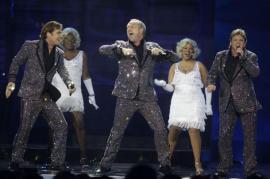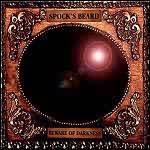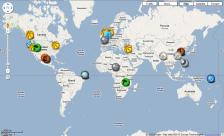Shineanthology’s Weblog
An anthology of optimistic, near future SFArchive for Music
Music that makes you feel optimistic, part 4
When we were driving home last May 31 from a Jon Oliva’s Pain gig (my brother, his wife, a good friend and me), my brother put Journey’s “Frontiers” in the CD player.

It struck me that the CD’s (well, it was an album back in the days) final two songs were about hope, moving forward and finding new frontiers.
To quote:
Out on the border
Of a changing skyline
We put hope in front of fear
And all the heroes
Have gone East of Eden
We all need new frontiers
(“Frontiers” from, well, Frontiers)
This was in the early eighties: financial crisis, cold war at its height, Reaganomics, Falkland War (I almost wrote Flakland War, which would define internet flame wars quite nicely…;-) and the Afghanistan conflict, and what did one of the top-selling bands(*) sing about? (Well, apart from love & relationships, obviously) Hope and a brighter future.
Like:
Make a move across the Rubicon
Futures knockin’ at your door
Take your time
And choose the road you want
Opportunity is yours
(“Rubicon”, also from Frontiers)
And the Journey covers were full-on SF, by the way, just check the Frontiers one above, and the Escape one below:

Kindred Spirits, part 5
Two things that put a smile on my face, albeit that the first one is a warm smile, and the second more of a wry one:
- The Fleas They Carried, an animal aid anthology edited by Jeff Richárd (note the accent aigu for pronunciation) has just been released through Lulu. All proceeds from this anthology will go towards reputable shelter and rescue groups, and will be matched dollar for dollar by the editor/publisher (within reason: if the antho sells like crazy then all you buyers will have outmatched the tireless editor, and that will be a great thing to happen). A caveat: I am one of the contributors to this anthology with my story “The Frog’s Pool” — which originally appeared in Nemonymous 4 — but have just ordered two (paper) copies — electronic ones are available, too — while, like the other contributors, not getting paid (apart from one electronic copy). The electronic copy looks great, and with fellow contributors like Eugie Foster and Mike Jasper this looks like a fine one (wish I wasn’t buried in slush, so I could read it quickly). Also, keep an eye on the Relief Anthology website: there are more projects coming up.

- What puts a wry smile on my face is the news that the Dutch entry to the Eurovision Song Festival didn’t even make it past the semi-finals. The tentative link to this very blog is that their song is called “Shine” (you can’t make such things up). Let’s say that the song isn’t exactly to my taste, and that the glittery suits that these ‘toppers’ were wearing just about signifies their style (tastes differ, and YMMV, of course*). The ‘toppers’ (literally translated: ‘those on top of the bill’; chart-toppers is about right) are hugely popular in Holland (not outside, because they sing mainly in Dutch), routinely selling out the Amsterdam Arena – home stadium of Ajax — several nights in a row. René Froger sold over 6 million albums in The Netherlands, and both Gordon (whose fortune is estimated at 8 million euros) and Jeroen van der Boom (two number one hitsingles in 2007) aren’t doing much worse, either. So pity is about the last thing we should feel for these ‘toppers’ not making the Eurovision final. The wry thing, though, is the fact that Gordon — a well-known homosexual**, who attends the Gay Pride Amsterdam
 — decided not to attend the Gay Pride in Moscow (which was banned), ‘for safety reasons’. And even if that gay pride rally was broken up by the Moscow riot police, it would have been a good opportunity to draw attention to Russia’s very poor record on gay rights, and humanitarian rights in general.
— decided not to attend the Gay Pride in Moscow (which was banned), ‘for safety reasons’. And even if that gay pride rally was broken up by the Moscow riot police, it would have been a good opportunity to draw attention to Russia’s very poor record on gay rights, and humanitarian rights in general.

* = I don’t follow the Eurovision song festival at all, but the song title ‘Shine’ just caught my eye;
** = I don’t like his music, which is a matter of taste. I do enjoy listening to other homosexual singers like Freddy Mercury, Rob Halford and Doug Pinnick.
UPDATE: Andy Remic has just launched the Science Fiction and Fantasy Ethics blog, whose mission is — “to celebrate everything positive, funky and exciting in the Fantasy, Science Fiction and Horror Universe!”
The SFFE is a core platform, a hub of authors who have banded together with the aim of celebrating all that is positive in genre fiction. We aim to leave cynicism and negativity at the door, and concentrate on what makes us smile, what entertains us, and what brings light and joy to our SF, fantasy and horror universe.
I’ll sure be keeping an eye on that one…;-)
Music that makes you feel optimistic, part 3
Your monthly dose of musical inspiration (I know, it’s not quite monthly yet. As soon as I have Outshine running smoothly I intend to put up posts here with more regularity).

Dream Theater — Images and Words
Actually, I don’t play this album that often, which might be one of the reasons that I still like it so much when I do put it in my CD player. If it had had the spontaneity and spunk of When Day and Dream Unite, and the sheer production values of Awake, then it would have been a huge classic. It’s a classic, nevertheless, albeit just that little farther away from perfection.
For one, I can understand drummer Mike Portnoy when he says he has troubles listening to Images and Words because of the triggered, electronic drum sound. It’s indeed a far cry from the fat, thundering drum roll that opens “6:00” on Awake. For another, though, the production as a whole is a step up from When Day and Dream Unite.
I also recall an interview in (Dutch magazine) Aardschok where Portnoy mentioned that David Prater — the producer — had them cut “Pull Me Under” from a much longer version to the 8:15 it is now. I think that was a good decision: “Pull Me Under” became a cult hit and brought Dream Theater in touch with a larger audience.

I love the superb interplay between the music and the lyrics (especially in the Kevin Moore songs), the way light (or the play of light) is woven through the album like a red thread, and — obviously — the upbeat tone. The album’s greatest strength, though, lies in its great melodic range and the sheer dynamics that implement it.
The dynamics in a song are immensely important (and are under serious threat ever since the loudness war rages through the music industry), and I think Dream Theater composed a number of eminent examples throughout the album, to wit:
- The opening chords of “Pull Me Under”: a classic example of how a sequence of higher notes following a lower one evokes a surge of optimism;
- The way the buildup from the refrain (‘lost in the clouds’) to the pre-chorus (‘this world is spinning around me’) to the actual chorus (‘pull me under’), in combination with the speeded-up interchange between keyboards, guitar and pounding rhythm section both mimick a feeling of floating in the sky, and an increased feeling of spinning, to the sheer guitar euphoria preceding the chorus;
- How “Surrounded” manages to evoke a feeling of rising from the darkness, of eventually being surrounded by light;
- The intro of “Metropolis, Part 1”: a simple yet effective keyboard sequence contrasted with a threatening guitar riff, the subtle intrusion of drums. An opener rife with tension and promise, and the song delivers;
- The fine balance of “Metropolis, part 1” between virtuosity and songwriting: on the one hand it constantly threatens to become an indulgence of musical showmanship, while on the other hand the rapid tempo changes and instrumental bravura make the song work;
- The tremendous build-up in the instrumental part of “Learning to Live”: first with the acoustic guitar and drums crescendoing into an exalting rush, then with the piano preluding the second rise into ecstasy;
There is much more in Images and Words, but these are the most telling examples. On top of that, the band makes this combination of a musical magnum opus through a lyrical pièce de résistance seem almost effortless. Like tour de force writing, though, it is anything but. Also, the album has an overall upbeat tone which I think is part of its enduring allure. Which brings me to the use of dynamics in SF writing.

I think we need more, much more, contrast and a greater dynamic range in SF writing. As Kim Stanley Robinson already mentioned at the New Scientist SF special, SF tends too much to extremes. It’s either dark or light; black or white; relentless dystopia or all-out utopia. Much too little in between.
That, in my humble opinion, is plain wrong: a positive development shines much brighter when it takes place against a dark background; a descent into chaos is more involving if there are a lot of good people trying to prevent it. SF isn’t quite reflecting the complexity of the real world: in reality — with precious little exceptions — things aren’t all bad, or all good, but rather a highly intricate mix of those (also depending on what one finds good or bad). A flatness of tone, a lack of dynamics not dissimilar from the loudness wars in music. In order to grab attention, everybody’s trying to scream from the top of their lungs, drawing what might have been a marked pessimism in contrast with a value-neutral world into relentless dystopia and apocalypse wars: my apocalypse is bigger and better than your apocalypse.
It’s not just a lack of chiaroscuro in theme and subject matter: it’s also the writing itself that so often lacks in dramatic tension. It seems that consistency of tone, tense and viewpoint have become sacrosanct, and this has led to a lot of fiction lacking that something special, that ingredient X, that je ne sais qua that would make it unforgettable. To paraphrase my good friend Lou Anders: a lack of exuberance.
 It’s possibly a matter of writers not willing to deviate from the lessons they learned (often the hard way, admitedly): don’t change your point of view (PoV) in a short story, keep the tense the same throughout the narrative (and preferably use past tense, as most SF is quite conservative) and don’t, for the love of Pete, change the tone of your short fiction. It leads to pieces that are perfectly competent, but not memorable.
It’s possibly a matter of writers not willing to deviate from the lessons they learned (often the hard way, admitedly): don’t change your point of view (PoV) in a short story, keep the tense the same throughout the narrative (and preferably use past tense, as most SF is quite conservative) and don’t, for the love of Pete, change the tone of your short fiction. It leads to pieces that are perfectly competent, but not memorable.
Therefore, dare to rise to the next level: experiment. If you’re aiming for a ‘middle-of-the-road’ career, then that’s exactly what you’ll be getting.
So shift a PoV, tilt reality to an oblique angle, change the tone of your narrative and change the tune to which your characters sing. Such contrasts can — if applied judiciously — build great tension arcs in a story. Combine them with a change of meaning — like, for example, the way the Rush lyrics of “Force Ten” (from the Hold Your Fire album) shift from ‘Look in … to the eye of the storm’ to ‘Look in … look the storm in the eye’ and so support a dramatic viewpoint shift — and you have dynamite. Or you might fall flat on your face, but at least you tried.
So imbue your fiction with an air of joie de vivre, infuse it with a huge dynamic range, and inject it with a change of meaning. A young band (at the time) like Dream Theater did it with their music, and the results were spectacular: why are so few new, young writers trying it?

Music that makes you feel optimistic, part 2
Or: Spock’s Beard.
Spock’s Beard entered the music scene with their debut album The Light in 1995. Especially the epynomous title track is still a classic. However, the albums I find myself listening to the most are Beware of Darkness (1996), The Kindness of Strangers (1998) and V (2000).
Music that makes you feel optimistic, part 1
This is not as easy as it sounds when you, like me, are a metalhead. Heavy Metal and horrific gloom go together like, well, bacon & eggs. Or to quote the Peaceville sampler I got free with my latest Aardschok (Dutch heavy metal magazine) issue: “21 years of Doom, Death & Darkness”.
It’s almost the polar opposite of what I’m trying to do with SHINE. Nevertheless, not all hardrock and heavy metal is immensely downbeat (and yes, I do love me some gloomy metal, too: last Friday I went to Slayer — not exactly messengers of the optimistic — and greatly enjoyed it).
So here is some music that makes me feel better, that can lift me up from a downbeat mood. Actually, much more than I can mention in a single post, so like ‘The Grapevine’, I’m making a series of it.
Today’s examples come from a 7-pack of discs (I have a CD-player that can hold up to 7 CDs) that I’ve been playing when writing two of my last short stories. Four of those don’t qualify as upbeat, but three do (or at least qualify partly):


































